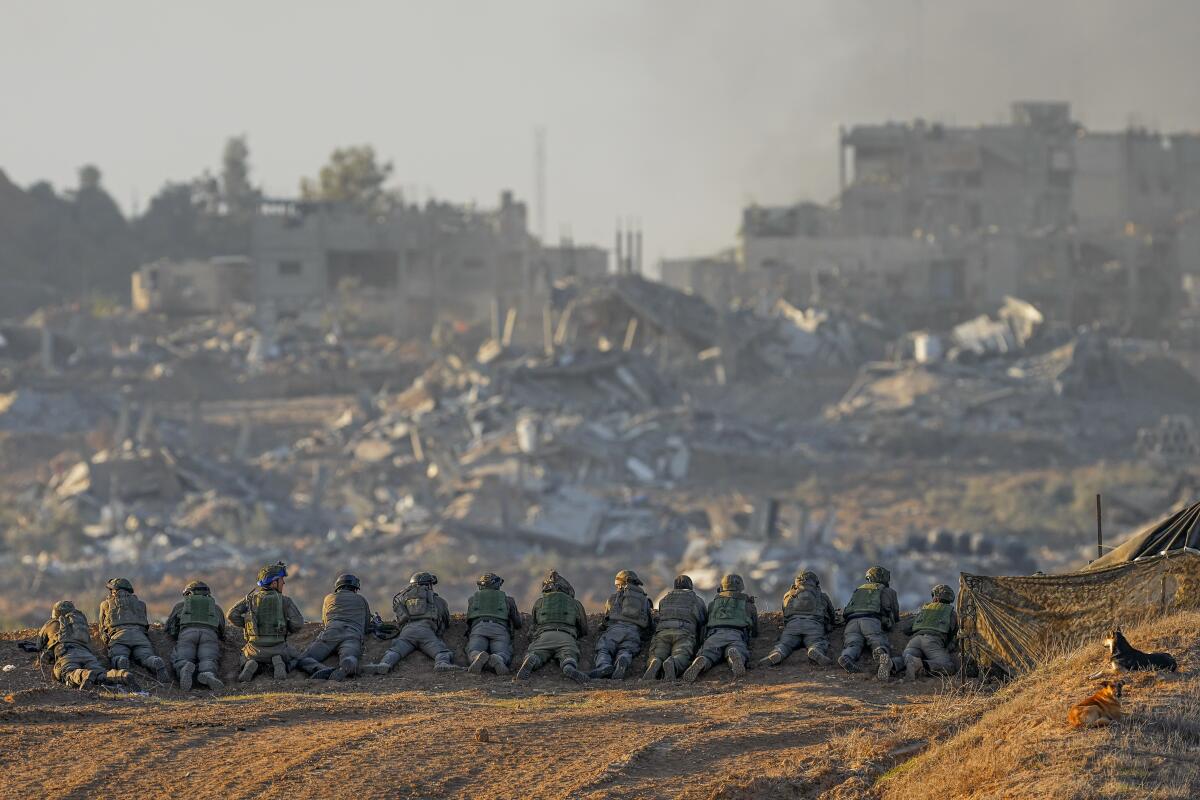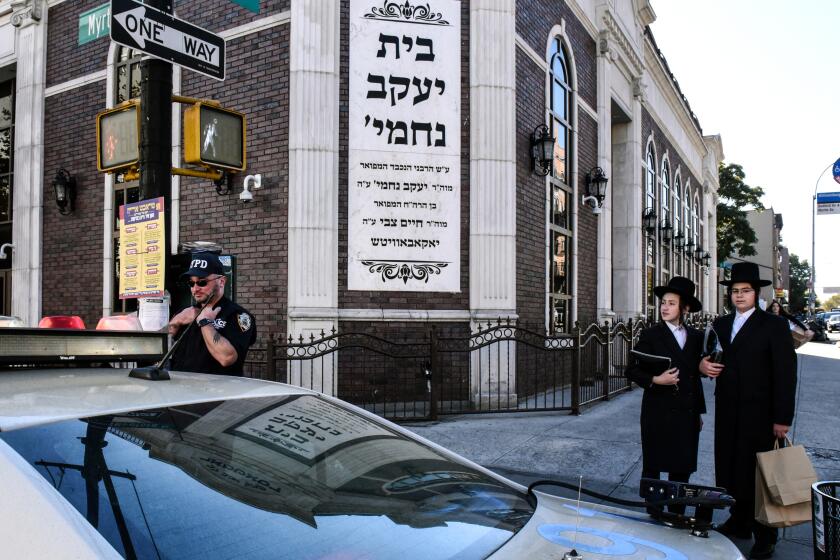Column: In an eye opener, most California Democrats don’t want U.S. siding with Israel

SACRAMENTO — This just seems startling to me: California Democrats think overwhelmingly that America should not take sides in the horrific war in Gaza. But Republicans side strongly with Israel.
That’s based on a statewide poll conducted by the nonpartisan Public Policy Institute of California.
It’s startling because for most of my life, the Democratic Party has emphatically backed Israel and has been solidly supported by Jewish voters and campaign donors. Democrats and Israel have been closely tied.
“Democratic candidates get support from Jews because of social issues and their advocacy on behalf of people of color and those struggling financially. That’s the Jewish culture,” says longtime Democratic strategist Darry Sragow, who is Jewish.
Bob Shrum, a former Democratic strategist who now is director of the Center for the Political Future at USC, points out that “the Democratic leadership still firmly supports Israel. Some people are outliers, but they don’t represent the majority of elected officials.”
Yes, but there clearly is a titanic shift in voter support for Israel that has been occurring for years and burst to the surface during the Israeli-Hamas bloodshed.
More specifically, there is a generational divide. Younger people are far less supportive of Israel than their elders.
After Hamas’ attack, the U.S. pledged full support for Israel. Now, as the death toll in Gaza skyrockets, President Biden is trying to rein in Netanyahu.
A PPIC survey in mid-November asked these three questions of California adults, and I’m using the exact wording for context:
Have you heard about the “escalating violence in Israel and Palestine?” Practically everyone had — 91%.
Does the United States have “a responsibility to do something about the fighting in Israel and the Palestinian territory between Israeli forces and Hamas?” People were split: Yes 37%, no 36%, not sure 27%.
Then the key question: “In the Israeli-Palestinian conflict, do you think the United States should take Israel’s side, the Palestinians’ side or not take either side?”
Among all adults surveyed in California, 61% said we should not take either side. Only 28% felt that the U.S. should side with Israel, even though America has been that nation’s sturdiest ally since its creation in 1948. Nine percent thought the U.S. should support the Palestinians.
A big eye opener was the responses of Democrats and Republicans.
Among Democrats, 63% said the U.S. should stay neutral. Just 19% backed Israel. And almost as many, 16%, sided with the Palestinians.
By contrast, 59% of Republicans said America should back Israel. A meager 4% sided with Palestinians and 37% opted for neutrality.
“I find these numbers jaw-dropping,” says Sacramento-based Republican consultant Rob Stutzman. He thought there’d be more Republicans advocating neutrality, more “non-interventionists.”
But he notes that Republican evangelical Christians long have supported Israeli control of the Holy Land.
Hamas — the Gaza-based militant group that started the current war with a murderous, maiming and hostage-taking rampage into Israel on Oct. 7 — was not mentioned in the questions. It was all about Israelis vs. Palestinians.
People under age 55 were especially for American neutrality.
“As the war has gone on, a lot of people would like to see it end — whether that’s wishful thinking or not,” PPIC polling director Mark Baldassare told me. “Sometimes there’s a hope that by not taking sides, they’ll find a way to settle the conflict.”
I particularly wanted to hear from Jewish legislators why they thought Democratic voter support for Israel is slipping.
“There is an understandable reluctance of folks to get involved in long-term conflicts,” says Assemblyman Jesse Gabriel (D-Encino), co-chair of the California Legislative Jewish Caucus.
“We’re trying to solve problems in other parts of the world while we’ve got a full plate in the U.S.”
But there’s a lot more going on than a trend toward less interventionism.
As Times reporters David Lauter and Jaweed Kaleem wrote last week, “antisemitism has sprung back to virulence in the U.S. … The upsurge began before the war in Gaza and has now accelerated.”
“Antisemitism is often referred to as the oldest hatred,” says state Sen. Scott Wiener (D-San Francisco), the other co-chair of the Legislative Jewish Caucus. “It has been with us forever and has gotten more overt.”
Even before the Gaza war, antisemitism was on the rise. That has deeply unsettled many American Jews, accustomed to seeing the U.S. as a safe haven.
Obviously not everyone who doesn’t support Israel is an antisemite. There are lots of nuances.
Start with the worldwide blowback against Israeli Prime Minister Benjamin Netanyahu’s conduct of the war — the relentless bombing and ground attacks that have killed more than 18,000 Palestinians, two-thirds of them women and children.
Jewish lawmakers agreed that is one reason Israel is losing Democratic voter support.
State Sen. Steve Glazer (D-Orinda) is a former Democratic political consultant and is Jewish. He says there’s a problem in how the Middle East turmoil has been “framed” in discussion.
“There’s language on the surface that appeals to Democrats — certainly younger people — but does not agree with historical fact,” he says. “Simplistic, loaded words like ‘colonizers’ and ‘apartheid.’ ‘Cease-fire’ is another alluring phrase. That’s easy to embrace, but is so wrong because it would allow Hamas to survive only to repeat this again.
“A political fight is always about framing.”
And things that are relatable — such as the Holocaust.
Older folks relate much more than young people do to the Holocaust that occurred roughly 80 years ago when the Nazis murdered 6 million Jews.
“A lot of us grew up with family and friends who were survivors,” Gabriel recalls. “People sat around the dinner table with [concentration camp] tattoos on their arms.”
He says “the polling that really bothered me” was conducted recently by YouGov for the Economist. It found that one-fifth of Americans ages 18-29 believe the Holocaust was a myth. Another 30% said they didn’t know whether it was a myth.
In all, half of American adults under 30 aren’t sure whether the Holocaust was fact or fiction.
That’s clearly a failure of American education.
More to Read
Sign up for Essential California
The most important California stories and recommendations in your inbox every morning.
You may occasionally receive promotional content from the Los Angeles Times.













